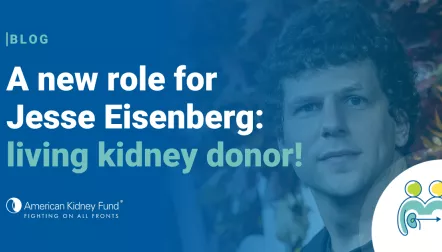
Blog post
A small inconvenience goes a long way

Watching a loved one battle kidney failure is an excruciatingly painful experience. It's a pain Lynne Wright, a social worker from Pennsylvania, knows all too well. Lynne's husband was born with polycystic kidney disease and she saw the toll the illness took on his body and spirit.
After years of waiting and several rounds of tests, Lynne's husband received a kidney transplant from a living donor in July 2019. "It was extraordinary — a 25-year-old woman who we barely knew and had lost touch with over the years came forward and gave him a kidney," Lynne said. "After that, I just decided that I wanted to make that change for someone else. I felt like I owed the universe something because this wonderful thing had been done for us." Her mind had been made up: she would donate one of her kidneys to someone in need.
"As a social worker, I wanted social justice to play a part in who I chose [to donate my kidney to], so I chose an African American woman named Roslyn Cooper who was a peer mentor," Lynne said. "I had only met her once before, but because of my husband's experience [where we didn't know his donor well], I just felt that I had to do it for somebody."
Already in great health when she made her decision, Lynne didn't have to make any major changes to her lifestyle in order to donate to Roslyn — in fact, the biggest hurdle was the testing. "I think my recipient was a little frustrated because the testing takes a while, and when you're on dialysis, you want to make it happen," Lynne said.
Lynne's surgery happened on March 9, 2020, just before the country largely shut down due to the COVID-19 pandemic. She said she was more scared of COVID than she was of the surgery itself. "I've had several surgeries and have always done well, including a hysterectomy around five years prior [to the transplant surgery]," Lynne said. "I knew there would be discomfort, as it's still abdominal surgery, but my small amount of discomfort would bring a huge amount of health and longevity to somebody else, just as that 25-year-old woman did for my husband."
Due to COVID-19 forcing workplaces to shut down and switch to telework, Lynne was able to recover at home with her adult children and her husband. "It was a great time to recuperate because my family could wait on me," Lynne said with a laugh. Other than some initial pain and discomfort in her abdomen, Lynne said her recovery process was very smooth and quick. In fact, she felt back to her normal self within two and half to three weeks.
Now, just over three years after donating her kidney, Lynne said she's feeling great. "I get blood work done annually, and my remaining kidney is doing fine," she said.
When asked what advice she would give to people who are considering becoming living donors, she said, "It's just a small inconvenience for you that results in an extraordinary amount of longevity and health for somebody else. The payout is so great. I smile whenever I think about [donating my kidney] because I know I did the right thing and it's something I feel obligated to brag about because I want other people to do it. You will not regret it."
To learn more about organ donation, visit our website: https://www.kidneyfund.org/kidney-donation-and-transplant/organ-and-tissue-donation





